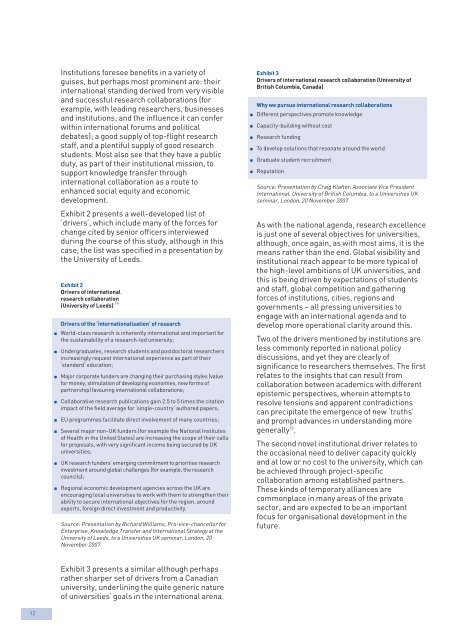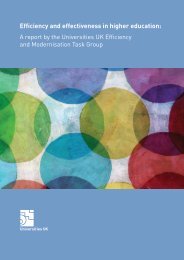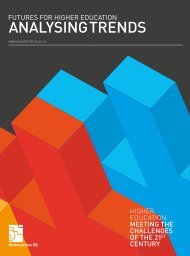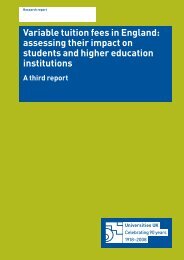International Research Collaboration - GlobalHigherEd
International Research Collaboration - GlobalHigherEd
International Research Collaboration - GlobalHigherEd
Create successful ePaper yourself
Turn your PDF publications into a flip-book with our unique Google optimized e-Paper software.
Institutions foresee benefits in a variety ofguises, but perhaps most prominent are: theirinternational standing derived from very visibleand successful research collaborations (forexample, with leading researchers, businessesand institutions; and the influence it can conferwithin international forums and politicaldebates); a good supply of top-flight researchstaff, and a plentiful supply of good researchstudents. Most also see that they have a publicduty, as part of their institutional mission, tosupport knowledge transfer throughinternational collaboration as a route toenhanced social equity and economicdevelopment.Exhibit 2 presents a well-developed list of‘drivers’, which include many of the forces forchange cited by senior officers interviewedduring the course of this study, although in thiscase, the list was specified in a presentation bythe University of Leeds.Exhibit 2Drivers of internationalresearch collaboration(University of Leeds) 14Drivers of the ‘internationalisation’ of researchp World-class research is inherently international and important forthe sustainability of a research-led university;p Undergraduates, research students and postdoctoral researchersincreasingly request international experience as part of their‘standard’ education;p Major corporate funders are changing their purchasing styles (valuefor money, stimulation of developing economies, new forms ofpartnership) favouring international collaborations;p Collaborative research publications gain 2.5 to 5 times the citationimpact of the field average for ‘single-country’ authored papers;p EU programmes facilitate direct involvement of many countries;p Several major non-UK funders (for example the National Institutesof Health in the United States) are increasing the scope of their callsfor proposals, with very significant income being secured by UKuniversities;p UK research funders’ emerging commitment to prioritise researchinvestment around global challenges (for example, the researchcouncils);p Regional economic development agencies across the UK areencouraging local universities to work with them to strengthen theirability to secure international objectives for the region, aroundexports, foreign direct investment and productivity.Source: Presentation by Richard Williams, Pro-vice-chancellor forEnterprise, Knowledge Transfer and <strong>International</strong> Strategy at theUniversity of Leeds, to a Universities UK seminar, London, 20November 2007Exhibit 3Drivers of international research collaboration (University ofBritish Columbia, Canada)Why we pursue international research collaborationsp Different perspectives promote knowledgep Capacity-building without costp <strong>Research</strong> fundingp To develop solutions that resonate around the worldp Graduate student recruitmentp ReputationSource: Presentation by Craig Klafter, Associate Vice President<strong>International</strong>, University of British Columbia, to a Universities UKseminar, London, 20 November 2007As with the national agenda, research excellenceis just one of several objectives for universities,although, once again, as with most aims, it is themeans rather than the end. Global visibility andinstitutional reach appear to be more typical ofthe high-level ambitions of UK universities, andthis is being driven by expectations of studentsand staff, global competition and gatheringforces of institutions, cities, regions andgovernments – all pressing universities toengage with an international agenda and todevelop more operational clarity around this.Two of the drivers mentioned by institutions areless commonly reported in national policydiscussions, and yet they are clearly ofsignificance to researchers themselves. The firstrelates to the insights that can result fromcollaboration between academics with differentepistemic perspectives, wherein attempts toresolve tensions and apparent contradictionscan precipitate the emergence of new ‘truths’and prompt advances in understanding moregenerally 15 .The second novel institutional driver relates tothe occasional need to deliver capacity quicklyand at low or no cost to the university, which canbe achieved through project-specificcollaboration among established partners.These kinds of temporary alliances arecommonplace in many areas of the privatesector, and are expected to be an importantfocus for organisational development in thefuture.Exhibit 3 presents a similar although perhapsrather sharper set of drivers from a Canadianuniversity, underlining the quite generic natureof universities’ goals in the international arena.12
















